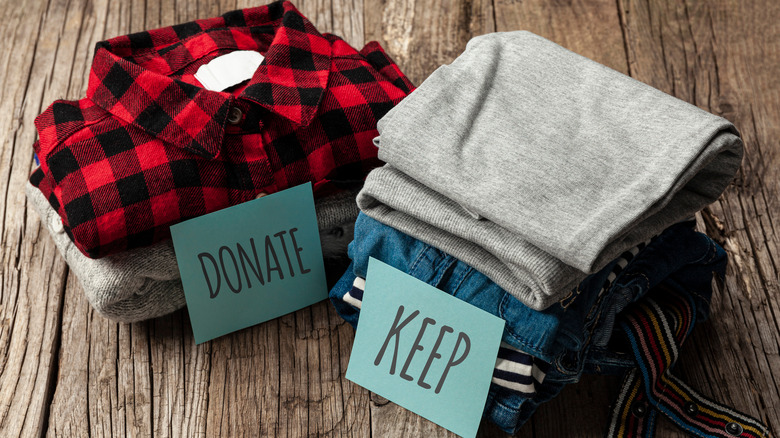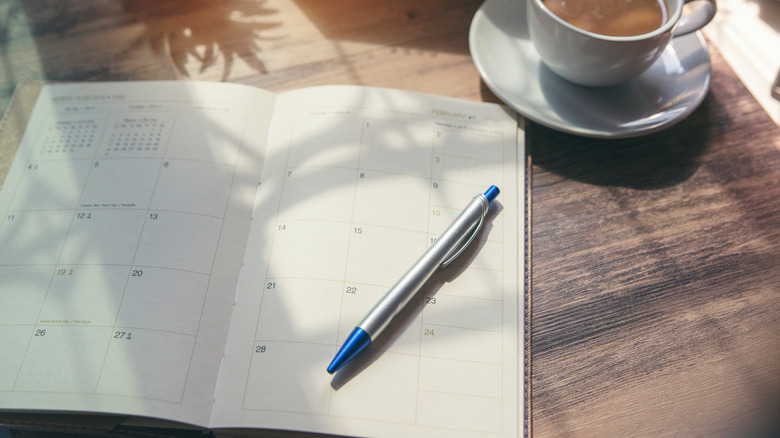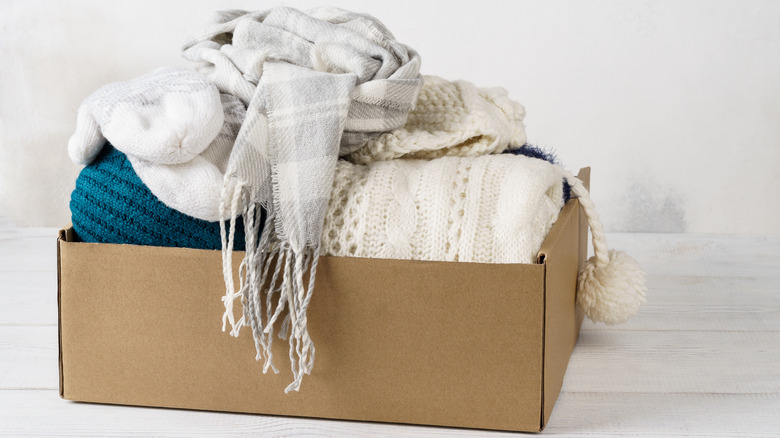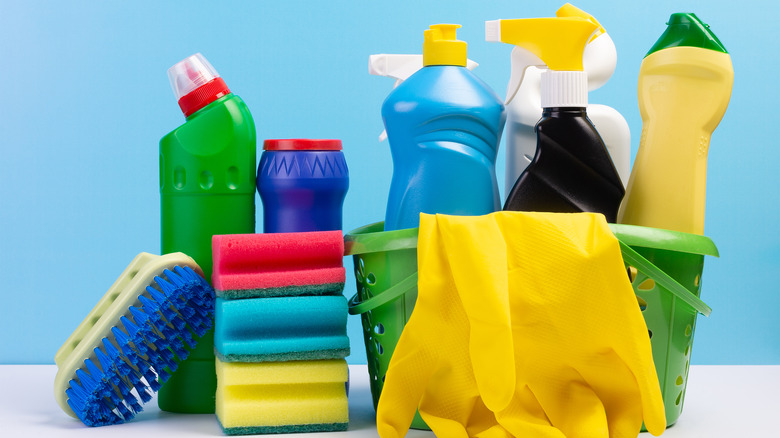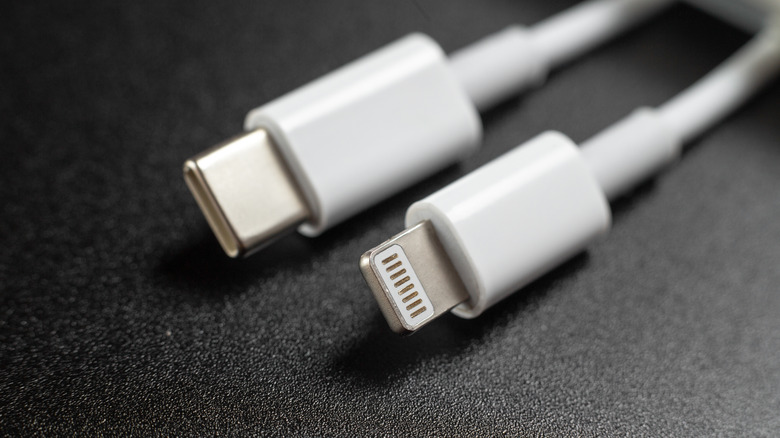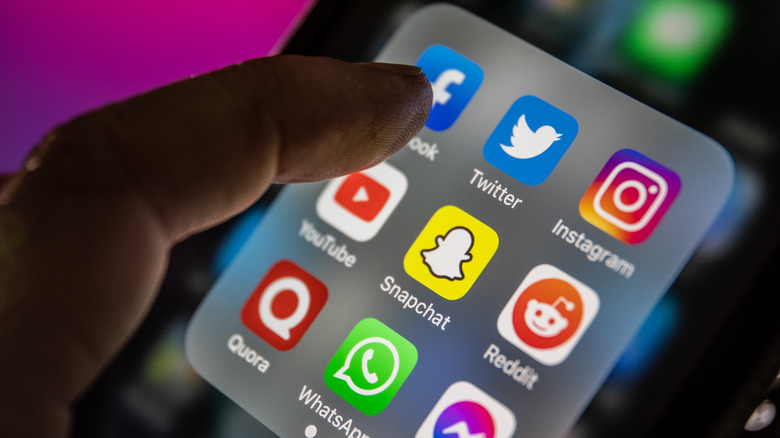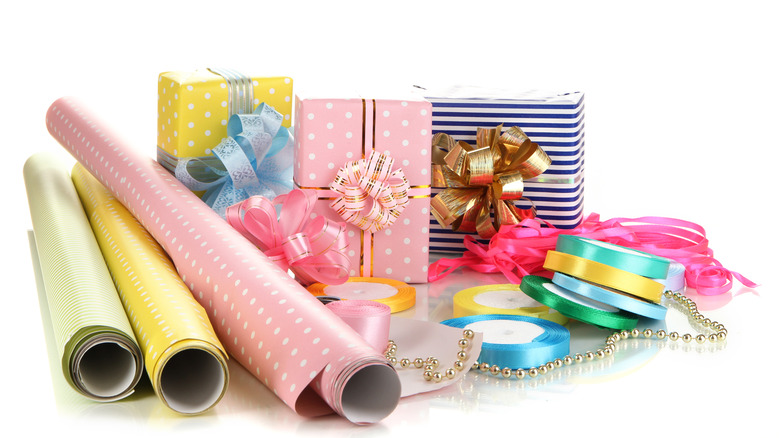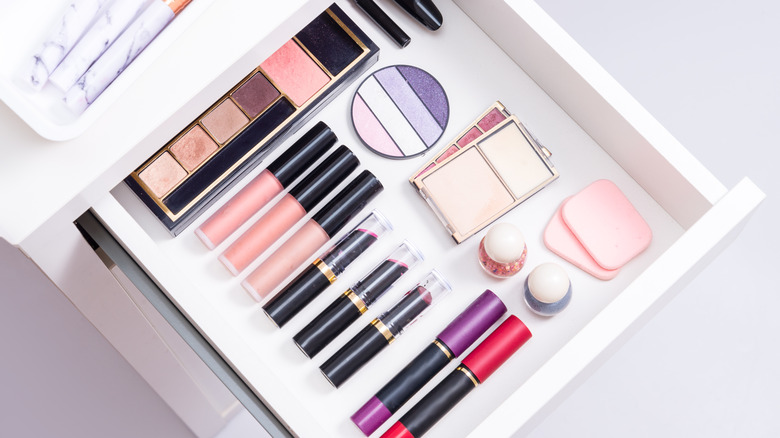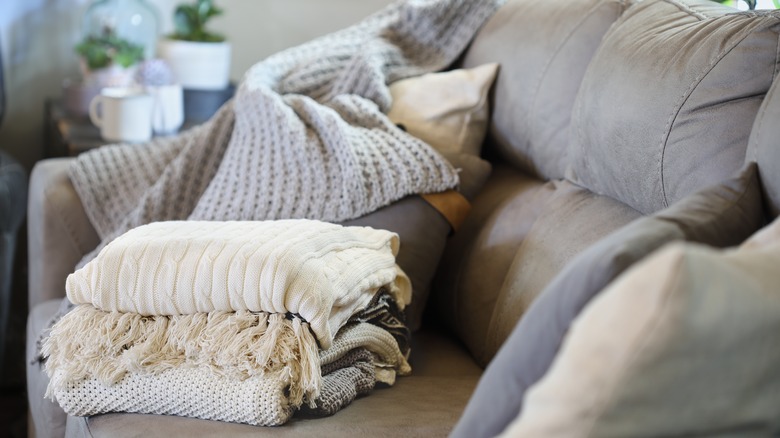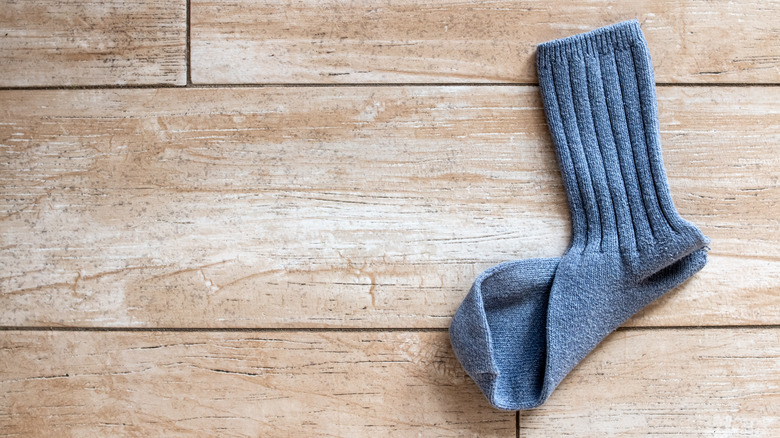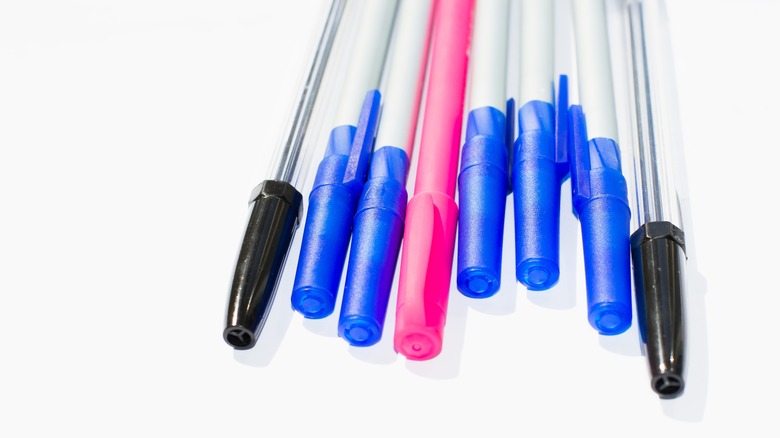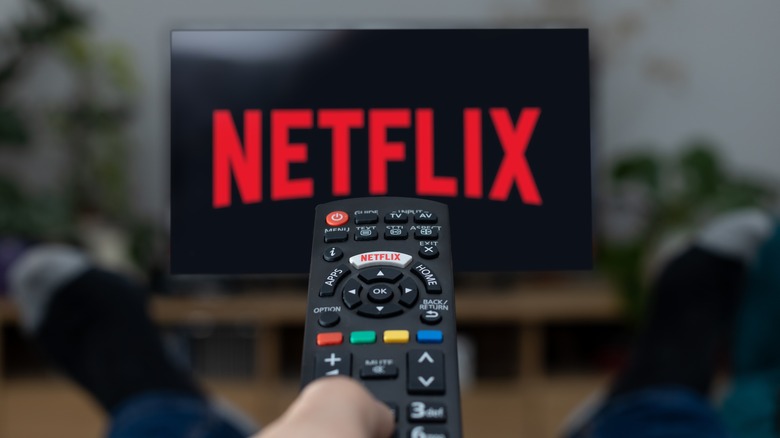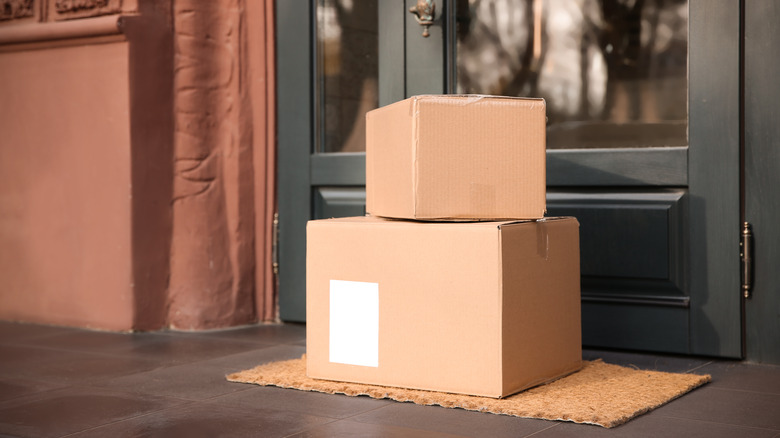Common Items People Forget To Declutter
Decluttering is a marathon, not a sprint, and the more you practice, the better you'll get at making decisions. If you're new to the process, it's important to take it slow. Getting rid of stuff you no longer want or need is not the most exciting thing, but going through your items every couple of months is necessary to keep your home organized. Clutter is not something you want to attract in your life continually. Not only is it an eye-sore and makes keeping a tidy home harder, but it has other mental health effects you may not be aware of.
According to Order & Bliss, clutter leads to less space, time, peace, focus, and money. But hurrying through the process isn't going to give you more of those magically. Why? Because you're only going to focus on the surface items — the things you can see and grab within easy reach. The truth is, when it comes to decluttering, many people forget about certain items. They're the smaller, almost insignificant things that don't seem to matter. But they do. Here are some of the most common items people forget to declutter.
Planners and calendars
Despite our digital age, many people still prefer physical planners and calendars. There are tons of studies that reveal how handwriting our goals and to-dos makes us remember them more. If you put everything in your phone, there's a higher chance of it disappearing into the ether of the cloud. A planner shows you every day what you need to get done. But once the calendar year is up, those planners don't hold any more merit. Their use is complete. And yet instead of recycling them, people store them away. Before you know it, you have a backlog of planners and calendars taking up valuable space in your home.
Some people hang on to these items if they used them for more than plans. Bullet journals, for example, might contain memories, project ideas, and other notes needed for the future. Some people also used sites like Shutterfly or Canva to create calendars with family pictures, making it difficult to toss them out. But it's important to let these items go when they no longer have a use. Go through and remove or copy any notes you need or, as Quality Logo Products suggests, upcycle your calendars into wall art or create your own bookmarks with the photos. Take the time you need to look through old planners for important notes, but don't hesitate to toss them in the recycling bin when you're done.
Hats and scarves
Many of us like to think we're hat people, but the truth is, we're not. And yet we keep buying hats for various reasons, growing our collection. Next thing you know, a year has passed, and they still sit in your closet untouched. Even if you are a hat person, owning more than you'll wear is common practice. That's why taking the time to declutter these from your life is important. Be realistic and ask yourself, "Which ones do I actually wear?" Do you walk or run and need a generic baseball hat for sunny days? Then keep one or two. But if you own three beach hats and barely make it to the coast, perhaps declutter all but one.
The same can be said for scarves. If you live in a climate that requires scarves for several months, it's fine to keep a selection on hand. However, be conscious of how many you keep. Luckily, scarves are easier to organize than hats, and you can do this in many ways. According to Closet Works, try tying three scarves onto a single hanger, or fold them into squares and dedicate a portion of your drawer to them. What matters most is keeping an amount that feels comfortable to you.
Free memorabilia
If you've ever been to a convention or an event, chances are booths were handing out free stuff. Travel mugs with company logos, water bottles, pens, notepads, lanyards, hats; you name it, a company has probably put their name and logo on it. This is the most common marketing technique used today. Who doesn't love free stuff? And if you need something the company provides, you're more inclined to contact them because you have a pen with all the information you need. Right? Wrong!
More often than not, that free stuff you got is probably sitting deep in a closet, drawer, or corner collecting dust. So if you want to limit the clutter in your home, you must learn to say no to freebies. Balagan Be Gone notes that many of these free items are cheaply produced, which means their value is already undermined. It's also an item many professional organizers tend to get rid of in the first appointment because their clients have no use or need for them. Once you've decluttered the free memorabilia you have, practice saying no, so you don't have to do it all over again in the future.
Expired cleaning supplies
Most people organize and store their cleaning supplies in the same place: underneath a kitchen or bathroom sink. Some may keep them in a hall closet, though the most common areas are the ones mentioned earlier. And yet, when decluttering, people skip this all-important section because, to them, it's not taking up space. When you clean, you also use these items, so why should you declutter them?
Well, believe it or not, cleaning supplies have an expiration date, and you should adhere to them. According to Kitchn, one of the major issues with expired cleaning products is that they don't clean as well. They won't damage your surfaces, but if you want to get things clean, you're going to need a lot more product. This is because the cleaning solutions become diluted over time, making them ineffective. While it's fine to keep using them a month or two after the expiration date, any longer than that and you'll need to involve a lot more elbow grease.
Cords and cables
We mentioned before how we're living at the peak of the digital age. That means a lot of technology has entered our homes, and thus a lot of cords and cables have joined them. Besides being a pain to organize, cords can become as obsolete as the tech they're meant to charge. This is because when new upgrades are released, manufacturers also develop better chargers. While this is a natural progression, it means you're left with dozens of outdated cords and cables.
Have you ever pulled a cord out of a storage box and asked, "What's this for?" The good news is that decluttering this item is actually quite easy. The Washington Post reports that the best way to get cords under control is simply dealing with them as soon as possible. Sort them into groups, and then discard ones you no longer need. It's fine to keep an extra charging cable for your phone, but you don't need five. The same goes for cables that charge things you don't own anymore. If you can't remember what it's for, recycle it.
Phone apps
Clutter isn't always a physical item. While things make up the bulk of our messes, digital clutter is becoming as much of an issue. Technology continues to improve, but you can also take necessary steps to help make your phones, tablets, and computers last longer simply by taking time to declutter them. This includes removing apps you don't use, files no longer needed, and backing up photos to an external hard drive. When it comes to battery life, PCMag reports that social media apps are the biggest drainers. We all love being on Facebook, Instagram, and TikTok, but staying constantly engaged will mean charging your battery more.
You may think this means it's time for a new phone, but if you declutter apps you no longer use and close the rest at the end of the day, you'll see your battery life improve. When deciding what apps to delete, consider how often you use them. Most phones have a section in your Settings where you can see how often you use certain apps. You can probably delete any that haven't been used in three months or more. Redownloading apps is super quick, so if you ever need it again, it'll take no time to reinstall.
Gift wrapping supplies
It's common to save wrapping paper supplies, especially if the ones you received are in great shape. Reusing gift bags, wrapping paper, and tissue paper can help save you money from buying new supplies when needed. But, like most of these items people forget to declutter, you can suddenly have a massive amount of gift wrapping stuff you don't know what to do with. You may not even use most of it, yet you hang onto it on the off chance you do. When decluttering these supplies, it's important first to sort them into categories. Put all bags together, gift tags, wrapping paper, and so on.
With a critical eye, ask yourself how much you really need of each one. Do you prefer wrapping gifts over stuffing them in bags? If so, keep more paper and declutter the majority of bags. If you have a ton of tissue paper that is wrinkled and torn, recycle it and replace it with a fresh set. When you're done decluttering, you can use some of Blue Pencil Home's suggestions for organizing all your leftover items. Her biggest recommendation is to keep all gift wrapping supplies together. So set up a section in a closet or buy a rolling cart or a gift wrapping organizer. This way, you know where everything is when needed.
Expired makeup
Like cleaning supplies, makeup does expire, and the last thing you want to do is put outdated makeup on your face. This can cause breakouts, rashes, and an unflattering cat eye if the makeup is flaky. Because cosmetics are often small and used daily, some people ignore them when decluttering. But it's super important to add it to your list and check the expiration date. Most products will list this in months from when the item is opened. When you start using a product for the first time, look at the date. Then use a marker or a label maker to put the month and year for when you should declutter it.
For example, a concealer is dated six months from the time of opening. If you open it in July, note that it expires in January. Do this with every new product you start using. If you don't see an expiration date, play it safe and mark it down for six months. The next step in decluttering makeup is disposing of it correctly. According to Lock and Key Home Organization, makeup should be brought to a local recycling center. If one is not available near you, try removing as much unused product as possible and recycle the containers regularly.
Unused or expired medication
The common medicine cabinet holds a lot. It's where many people store prescription drugs, over-the-counter pills, and other necessary needs like deodorant and shaving cream. And like cleaning supplies and makeup, the medication you keep there does expire. It's also another common area people forget to declutter because the items there are often out of sight, out of mind. However, getting rid of expired medication is vital as it decreases your chances of using it when it's long overdue. The FDA highly recommends people not take the risk and use expired medicines.
Chemical composition changes the longer medicine sits unused, and many decrease in strength. That means if you take a pain reliever that's expired and don't feel better, you'll take more without realizing that it's not the pill; it's the expiration date. It's not uncommon to have a lot of expired or unused medication in your home. So make sure you add "medicine cabinet" to your next decluttering list. Chances are you'll find a lot to throw away.
Worn out throw pillows and blankets
Many people like to decorate their living space with blankets and throw pillows. These are perfect decor pieces that add a touch of personality while also being usable. You can mix and match different sets and buy ones for each season and/or holiday. However, blankets and pillows, like most linen products, tend to wear out over time. They become flat, thin, ripped, and lose their comfort. And yet, rather than declutter and replace them, people hang on to them. Because pillows and blankets keep us comfortable, people grow a certain attachment to them.
Becoming attached to comfort pieces is not uncommon, but since they fall into sentimentality, it'll be harder to declutter. If you're truly connected to a certain blanket or pillow, consider what Order & Bliss suggests, and repurpose it. Can you turn that blanket into wall art? Can you send it to a tailor to fix it up? Can you cut the pattern from the pillow and use it to decorate a memory box? You can repurpose or upcycle blankets and pillows in many ways, but remember that recycling them is also fine once they've outlived their use.
Singles (earrings, socks, gloves)
It's a regular occurrence in any household that pairs will sometimes get separated. You'll lose a sock or an earring. Sometimes the left glove will vanish into thin air. You hope that by hanging onto the single piece, you'll eventually find its partner., but months go by, and there's no luck. This is when you should declutter the single item and if, by chance, you find its pairing, get rid of it too.
Choosing to declutter a single item doesn't mean you've failed at finding its other half. Sometimes they become lost for good, and there's nothing you can do except rid yourself of the burden and declutter the item. Or you can repurpose the one you have left. DIY & Crafts suggests turning them into rags for cleaning, making them into mug warmers, bean bags, a chew toy for your pet, and more. The possibilities are endless.
Pens and other writing instruments
There's no way to say this other than to say it: You have too many pens. One of the most common items skipped in the decluttering process is writing instruments, but for a good reason. You need pens to write. And yet we can never seem to find pens when we need them. That leads us to buy more, only to find a ton buried in a drawer with other writing supplies like pencils, markers, and highlighters. These are small items that accumulate fast and if you're not careful, you'll have more than you know what to do with.
Home Storage Solutions says it's important to make it a habit to sort through them and throw away any that don't work. If you don't like the feel of a certain pen, declutter it. If you have a ton of pencils that have been sharpened down to the tip, toss them. Throw out any markers or highlighters that are dull or flat-tipped. When you're adamant about decluttering pens and other writing instruments, you'll be better at checking for other small items like paperclips, rubber bands, and staples.
Unused subscription services
Outside of your phone apps, another important digital item you should work on decluttering now and then are subscription services. With all the streaming channels available today, it's hard to decide what to keep. Many people find themselves paying for services they don't use, which can leave a pretty big hole in your wallet if you don't take care of it. There are more services that go beyond entertainment. You should also monitor learning subscriptions like Skillshare, Masterclass, and Domestika.
According to Cnet, the best way to decide what streaming apps to keep is to see what you can bundle together. For example, Hulu, Disney+, and ESPN are popular bundles many people opt for. But outside of bundling, you can also try alternating the services. If you check local listings, you can learn when certain shows are released, and you can switch services according to their schedule. You can pay for Netflix for three months, watch what you want, then cancel and switch to Hulu. What's most important is that you declutter or cancel any that you simply don't use or watch.
Delivery packages
Online shopping has never been easier. Many brick-and-mortar stores have closed because they're not always able to keep up with the demand for online purchases. It's easier, convenient, and often cheaper. In fact, the Census Bureau noted that e-commerce sales surged by 43% during the first year of the pandemic and kept going up. But with consistent online shopping comes consistent deliveries, which means more packages in your home. How long do you wait to open up a package? Do you let it sit on your kitchen counter for a few days? Do you remove the item and throw the box to the side, promising you'll deal with it later?
If you don't make it a habit to break down and recycle your delivery packages, they will fill up your home before you know it. Make it a weekly practice to unbox, organize, and recycle them as soon as possible. This will limit the clutter in your home as well as force you to ensure the product is what you need. Many people wait too long, and by the time they check out the item and want to return it, they've missed the window. So make sure you take care of those bags and boxes as soon as possible to eliminate unnecessary clutter later.
